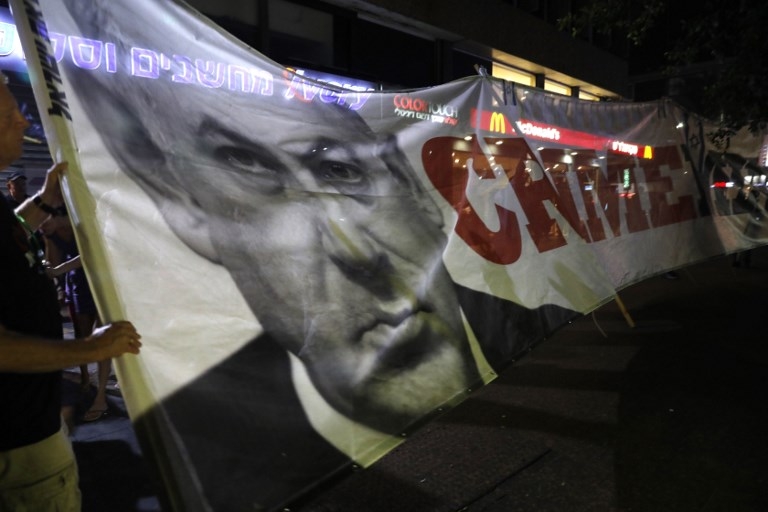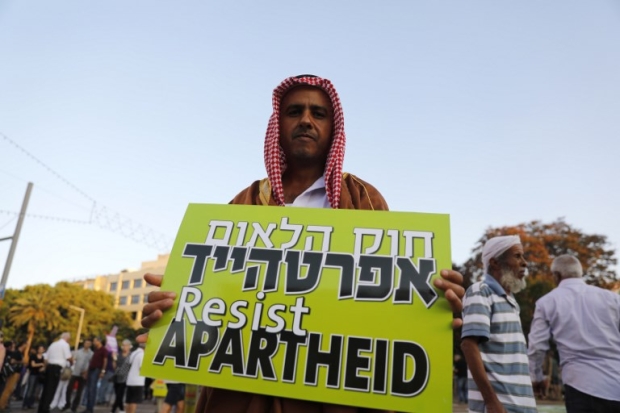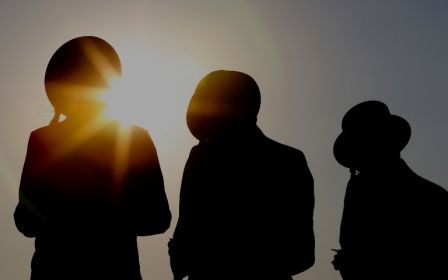In 2018, Israel’s mask finally came off

2018 wasn’t a good year for Israel. It was even worse for Palestinians, of course.
On the surface, it wasn’t an especially dramatic year - just a lot more of the same, without major new wars, and without much bloodshed if you compare it to most previous years. Things appeared frozen in place. The occupation continued without impediment, likewise the settlement enterprise. Gaza tried to resist forcefully from inside its wretched cage, using its paltry and limited powers.
The world averted its eyes from the occupation, as it has customarily done in recent years, and focused on other things entirely.
Israelis, like the rest of the world, took no interest in the occupation, as they’ve done for decades now. They silently went on with daily life and it was good, prosperous. The aim of the current government - the most right-wing, religious and nationalist in Israel’s history - to maintain the status quo in every way, was achieved in full. Nothing happened to interfere with the five-decade-strong occupation.
Moving towards formal annexation
It would be a grave mistake, however, to think that everything stayed the same. There is nothing status-quo about occupation or apartheid, even if it sometimes seems that way.
2018 was the year when the legislative infrastructure was put in place for what is to come. Slowly and surely, with one law after another, the legislative foundation was laid for the reality that has already existed in practice for a long time. A few legislative proposals evoked an argument, sometimes even raucous disagreement - but that, too, came and went.
The Green Line was expunged a long time ago, the territories annexed de facto. But that’s not enough for the right wing, which has concluded that to make the occupation permanent, appropriate legal and legislative steps must also be taken
It would be a mistake to address each new legislative initiative, however drastic and antidemocratic, separately. Each is part of a calculated, fateful and dangerous series. Its goal: formal annexation of the territories, starting with Area C.
Thus far, the practical foundation has been laid on the ground. The Green Line was expunged a long time ago, the territories annexed de facto. But that’s not enough for the right wing, which has concluded that to make the occupation permanent, appropriate legal and legislative steps must also be taken.
First, they built settlements, where more than 700,000 Jews now reside, including in East Jerusalem, to create an irreversible reality in the territories. This enterprise is complete, and the victory of the settlers and their supporters is clear and unequivocal. The aim of the settlements - to thwart any prospect of establishing a Palestinian state in the territories occupied in 1967, and to take the two-state solution off the table - has been wholly accomplished; they’ve won. Now, they intend that this irrevocable reality shall also be anchored in law, to neutralise the opposition to annexation.
Countering opposition
This is the main goal of every discriminatory and nationalist law passed in 2018 by Israel’s 20th Knesset. Each and every one is intended to counter the vestiges of opposition to the annexation of the territories.
Resistance was expected from Israel’s legal system and also from the small, shrivelled remains of a left wing in civil society. War was declared on both, to weaken them and vanquish them once and for all, as we approach annexation. Until that happens, and if this trend continues into the next administration, there will be no further significant resistance in civil society, and Israel can get on with setting up its new regime.
Apartheid has been in place in the territories for a long time, and now it will be on the law books, too. Those who deny Israeli apartheid - the pro-Zionist propagandists who claim that unlike in South Africa, in Israel there are no racialist laws or legislatively institutionalised discrimination - will no longer be able to disseminate their baseless arguments.
Some of the laws passed this year, and those in the legislative pipeline, undermine the claim that Israel is an egalitarian democracy. Yet, such legislation also has a positive side: these laws and the ones to come will strip away the disguise, and one of the longest masquerades in history will finally end. Israel will no longer be able to continue defining itself as a democracy - “the only one in the Middle East”.
With laws like these, it won’t be able to reject the apartheid label. The darling of the West will reveal its true face: not democratic, not egalitarian, not the only one in the Middle East. No more pretending.
The appearance of equality
It’s true that one of the first laws ever adopted in Israel - and perhaps the most important and fateful of them all, the Law of Return, passed in 1950 - marked the direction a long time ago in the clearest possible manner: Israel would be a state that privileges one ethnic group over another. The Law of Return was intended for Jews only.
But the appearance of equality somehow endured. Even the long years of occupation did not alter that: Israel pretended that the occupation was temporary, that its end was in sight, and so it wasn’t part of the egalitarian democratic state that had been so proudly established. But after the first 50 years of occupation, and with the critical mass of Jewish citizens who went to live in the occupied territories on land stolen from Palestinians, the claim to transience could be taken seriously no longer.
Until recently, Israel’s efforts were directed mainly at establishing and enlarging the settlements, while suppressing Palestinians’ resistance to the occupation and maximally embittering their lives in hopes that they would draw the necessary conclusions: get up, and leave the country that had been theirs. In 2018, the centre of gravity for these efforts shifted to the legislative arena.
Foremost is the nation-state law, passed in July. Following the Law of Return, which automatically allows any Jew to immigrate to Israel, and legislation that allows the Jewish National Fund to sell land to Jews only, the nation-state law became next in line for the apartheid state that is coming. It formally bestows a privileged status on Jews, including on their language and settlements, over the rights of indigenous Arabs. It contains no word of equality, in a state where in any case there is none.
At the same time, the Knesset passed another few laws and began a few additional initiatives in the same spirit.
Targeting BDS supporters
An amendment to the state’s education law was passed in July. In Israel, it’s called the “Breaking the Silence” law, because its real purpose was to prevent left-wing organisations from entering schools in Israel to speak to students. It’s about breaking the resistance to annexation.
Likewise, an amendment to the boycott law enabling legal action against Israelis for publicly supporting the boycott, divestment and sanctions (BDS) movement will make it possible to bring damage suits against boycott supporters, even without proving any economic damage.
One more right-wing administration like this one, and it will be forbidden to support the boycott in Israel, period. Then, it will also become forbidden to criticise Israeli soldiers or their iniquitous behaviour in the territories. Legislative proposals like these are already circulating, and their day will come, fairly quickly.
Another law passed this year transfers appeals by Palestinians against the abuses of the occupation from the Israeli Supreme Court, which hasn’t been all that useful to them anyway, to the Jerusalem District Court, where they are expected to receive even less judicial relief.
A law to expel the families of terrorists passed its preliminary reading in the Knesset, against the advice of the attorney general; it will enable collective punishment in the territories, for Arabs only. They are also talking here about capital punishment for terrorists.
The relative quiet that has prevailed in the country is deceptive. The apartheid state de jure, not just de facto, is coming
And the Arrangements Law, which whitewashes dozens of settlement outposts that are illegal even according to the Israeli government, was also passed. Only the “cultural loyalty law”, a legislative nadir that seeks to enforce loyalty to the state as a precondition for obtaining government funding for cultural and arts institutions, has been frozen for now - but not forever.
Legislative cover
The laws passed this year must not be viewed solely as anti-democratic laws that endanger Israel’s democracy, as the situation is usually described by liberal circles in Israel. They are intended to do something much more dangerous. They aren’t intended just to undermine the bogus democracy, to impose yet more discrimination on Palestinian citizens of Israel and turn them into second-class citizens by law. Their real intention is to provide legislative cover for the act of formally annexing the territories beyond the recognised sovereign boundaries of the state of Israel.
In 2018, Israel moved closer to realising these objectives. The relative quiet that has prevailed in the country is deceptive. The apartheid state de jure, not just de facto, is coming.
- Gideon Levy is a Haaretz columnist and a member of the newspaper's editorial board. Levy joined Haaretz in 1982, and spent four years as the newspaper's deputy editor. He was awarded the 2015 Olof Palme human rights prize and was the recipient of the Euro-Med Journalist Prize for 2008; the Leipzig Freedom Prize in 2001; the Israeli Journalists’ Union Prize in 1997; and The Association of Human Rights in Israel Award for 1996. His book, The Punishment of Gaza, was published by Verso in 2010.
The views expressed in this article belong to the author and do not necessarily reflect the editorial policy of Middle East Eye.
Photo: Demonstrators carry a giant banner depicting Israeli Prime Minister Benjamin Netanyahu, with ‘Crime Minister’ inscribed on it, during a rally to protest against the nation-state law in Tel Aviv on 11 August (AFP)
This article is available in French on Middle East Eye French edition.
New MEE newsletter: Jerusalem Dispatch
Sign up to get the latest insights and analysis on Israel-Palestine, alongside Turkey Unpacked and other MEE newsletters
Middle East Eye delivers independent and unrivalled coverage and analysis of the Middle East, North Africa and beyond. To learn more about republishing this content and the associated fees, please fill out this form. More about MEE can be found here.







